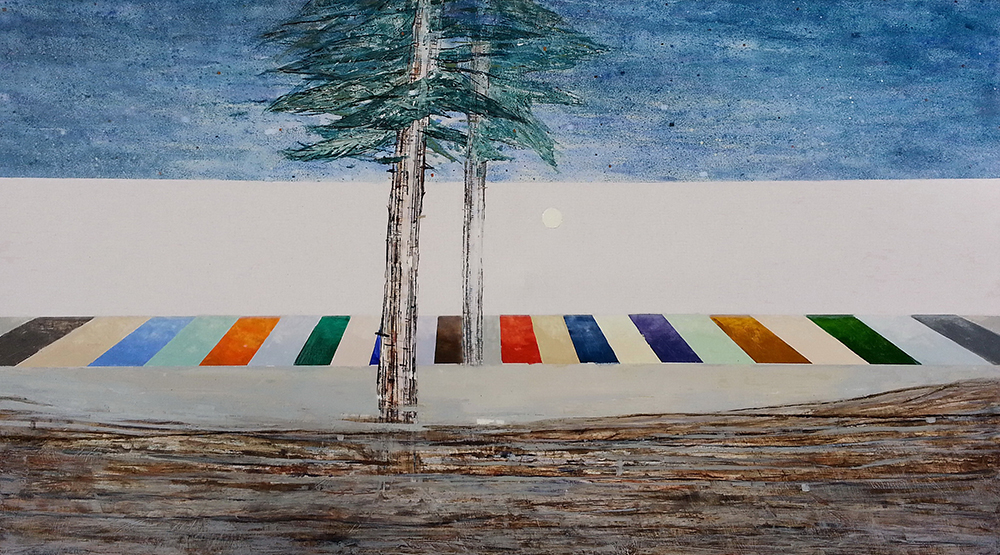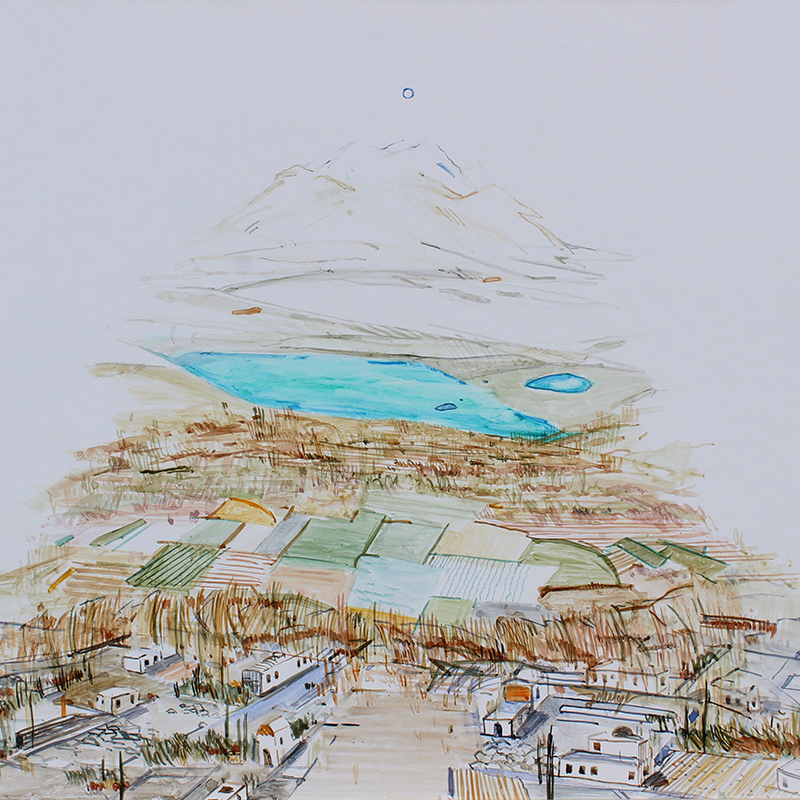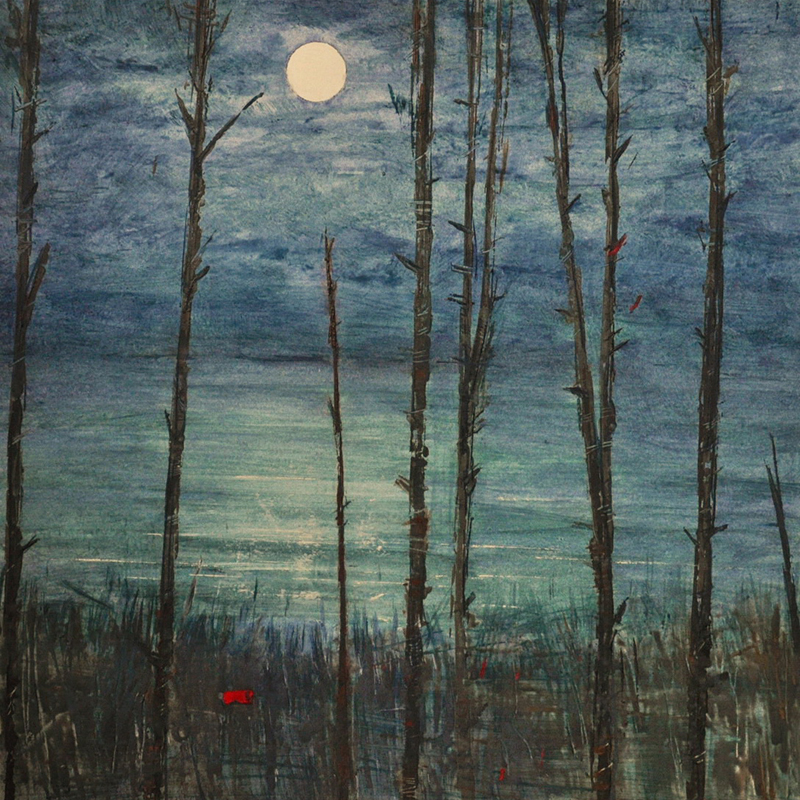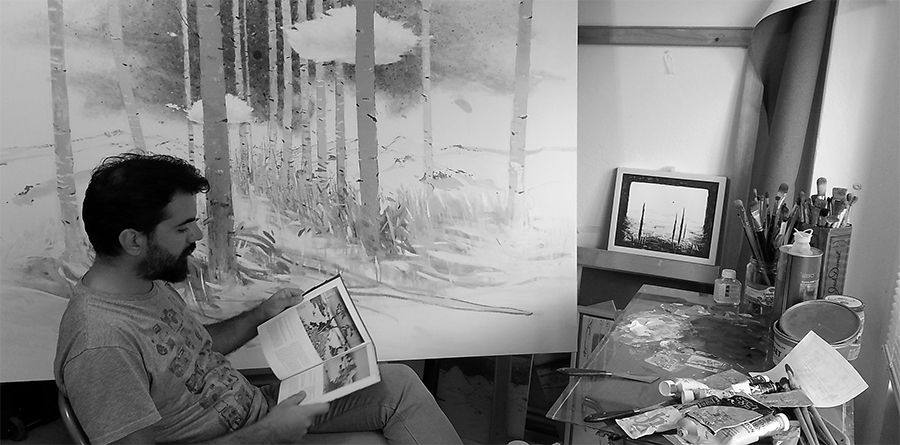In his works, Fatih Dülger focuses on the concept of void. He chooses painting both as a reaction to the loss of nature and an effort to understand it; he refers to painting as an indispensable act that makes life more bearable. We dived deep into a conversation with Fatih about his artistic practice.

How did you decide to pursue an artistic career? How did your interest in art emerge?
I started painting at an early age and it emerged completely naturally; there was no guidance. When I was in middle school, I used to make gouache and oil copies and dedicated considerable time to painting. University was a decision time for me, and since then the process has been going on more seriously. Being involved in art has always made life more livable for me. This gives me motivation and continuity.
Your works evidently manifest sensitivity for nature. What kind of a nature is it? Similarly, you are deeply involved in the concepts of void and space. How do you study them in your paintings?
The first thing that drove me to nature was probably my anxiety for its extinction and loss of beauty. We often lack the time and opportunity to fully experience it, and I try to compensate for it by incorporating it into my paintings. In this sense we may talk about a romantic approach, but during the production process I behave rather analytically. Although my images of nature reflect what is natural, they also illustrate an artificial, fictional and calculated order. In fact, I don’t try to imitate something that exists by itself but I aim at analyzing and understanding it. I try to create alternative compositions and spaces by using essentially identical or similar elements, thinking about the ways in which we can use the wide range of materials offered to us by nature. At this point, the “void” becomes very functional both conceptually and plastically. As it ceases to be an instrument or an element and dominates the painting’s source and thus its meaning, the resistance the remaining things build against this dominant void generates a form of spatiality. And although this painterly problem is my main area of interest, we may also refer to the philosophical, religious and scientific meanings of the concept of void as the source of this priority. It is a very significant term in various fields ranging from existential philosophy to Taoism and Quantum physics, to the extent that this plurality renders its definition rather difficult. For me, a concept open to so many different and deep meanings is a strong source of inspiration.

You also work as an academic instructor. What would you like to tell us about it?
I received my B.F.A. and M.F.A. degrees from Mimar Sinan Fine Arts University but I work at the Department of Artwork Conservation and Restoration at the same university. The department is exciting for me as it offers alternative possibilities. Examining and understanding artistic processes in more detailed and technical terms means information about the artists’ lives and how they relate to art. In addition to several advantages, being at a university may also bring about a time management problem, especially during the creative process. This situation renders my time dedicated to painting even more valuable.
Do those who receive art education in Turkey have their expectations satistifed once and/or after they graduate? How do you think art education can be improved?
To be honest, I don’t think people have well defined expectations in the beginning of their university education; expectations emerge later and thus we are late. So the problem starts early on. Those who know what the want to do in life start taking what they want from life without remaining stuck; this is a completely personal issue. And as art is a personal matter, art education should be able to respond to this personalization as well. It should not limit individuals’ possibilities by directing them towards a certain conclusion and should not stand in their way. If the education is based on classical drawing or certain schools of thought, this attitude should be strictly preserved.

What are your projects and dreams for the future? Any concepts or subject matters you are interested in that you haven’t had the chance to study yet?
I don’t have dreams for a painting career; it’s enough for me to be able to paint and to have the necessary motivation and arguments to do so. In the near future, I intend to further enrich my repertoire of materials; the material itself may become, perhaps occasionally, the artwork’s subject matter. In terms of concepts, I have lately been thinking about sleep as one of the places where the void takes me, and that, in a sense, is actually a state of coma. Departing from here it seems feasible to produce a series of figurative works and I have even started to work on some sketches already. Moreover, the notions of reality and virtual reality have always been interesting for me. I would like to experience producing works in the digital environment , although it doesn’t seem it will happen in the nearest future.
Click for the artist page.

